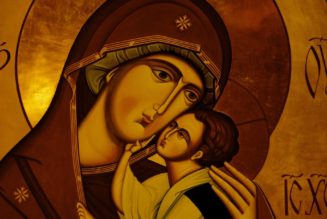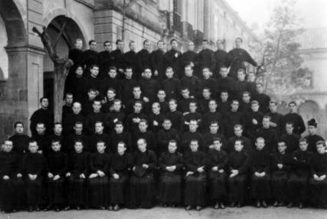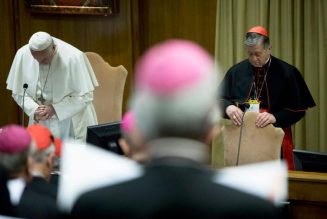, April 9, 2020
Before Easter, the apostles hid their faith away like it was a virus.
When they emerged from their self-quarantine to discover that Jesus Christ had risen, they found the strength to boldly confront the world with their faith.
Today, we have the worrying and hiding part down pat. Now, on Easter Sunday, Year A, Jesus Christ himself is expecting each of us to do the next part and proclaim our faith.
The readings give different approaches to Easter, each of them valuable.
The Gospel reading is a very personal account of what it was like to experience a miracle. The apostles hear Mary Magdalene say, “They have taken the Lord from the tomb, and we don’t know where they put him,” That is enough to send Peter and John racing to the tomb, where John looks into the tomb, sees the burial clothes, and believes.
The second reading is written by Paul, who experienced the Risen Jesus much later. He sees the Resurrection in terms of the deep union Christians have with Jesus. Paul tells each of us, “You have died, and your life is hidden with Christ in God,” and “If you were raised with Christ, seek what is above.”
The Psalm gives the backstory to the resurrection, saying “The stone which the builders rejected has become the cornerstone,” and “it is wonderful in our eyes.”
But before all of these is the first reading, the magisterial pronouncement of the Resurrection by St. Peter to the Gentiles, which combines all those approaches: Eyewitness account, spiritual union, and persuasion. That makes Peter’s message a great model of what our own Easter messages should be.
First, Peter references real things his audience has experienced. So should we.
“You know what has happened all over Judea, beginning in Galilee after the baptism that John preached,” said Peter, “how God anointed Jesus of Nazareth with the Holy Spirit and power.”
We know what our audience has experienced today: The pain of living in a world without meaning, the mounting anxiety and despair that has driven the suicide rate ever higher, even before the added worries about disease, death and the economy pushed anxiety levels further still.
The Easter faith of Christians is the ultimate answer to all of it. Do people feel like they have no purpose? Easter tells us we were made in the image and likeness of God, with a role to play in salvation history. Do suffering and death seem to have no meaning? Jesus Christ joined us in our pain so that in our suffering we can meet God. Are we mired in mediocrity? Easter tells us that each one of us can achieve greatness and glory by uniting the smallest things we do with the sacrifice of Jesus Christ.
The world desperately needs to hear this message, and we are the only ones available to share it.
Second, Peter describes Jesus in terms of goodness.
Peter’s succinct description of Jesus Christ is that “He went about doing good.” We shouldn’t be too shy to tell the world that Jesus Christ still “goes about doing good.”
Tell people about the Catholic nurses who, following in the footsteps of the 9/11 Catholic first responders, serve COVID-19 patients at personal risk, following a faith that tells them that laying down their life for others is the ultimate expression of love.
Tell them what the non-Catholic Nikki Haley said when she was ambassador to the United Nations in 2018, after visiting places “hard for most Americans to imagine.”
“I’ve been to the border between Colombia and Venezuela, where people walk three hours each way in the blazing sun to get the only meal that they will have that day. Who’s giving that meal? The Catholic Church,” she said. “I’ve been to refugee camps in Central Africa where young boys are kidnapped and forced to become child soldiers and young girls are raped as a matter of routine. Who was in the forefront of changing this culture of corruption and violence? The Catholic Church.”
Jesus Christ still “goes about doing good,” in his followers. The Church clothes, feeds, heals, and educates the poor — of any race, creed and lifestyle — worldwide at the cost of billions of dollars that it gives away for free. We do it in religious orders of nuns who serve the elderly and the poorest of the poor, in priests who sacrifice the comfort of a family to being hope to others, and in lay people who deliver meals to shut-ins, clothes and blankets to the homeless and educate children to rise out of poverty.
Next, Peter argues based on truth.
“They put him to death by hanging him on a tree,” said Peter. “This man God raised on the third day.”
There are good reasons to believe in the resurrection. Even skeptics recognize that the Gospels tell a story that doesn’t sound made-up. When cult-leaders invent a religion they make themselves the heroes of their story. The apostles look like bumbling cowards in their own Gospels.
Jesus appeared to more than 500 people at one time, a fact Paul shared while many of those people were still alive. Those people not only believed, they suffered and died for their belief. In fact, they still do. Our own 21st century has seen more martyrs than ever before.
Do not believe the lies that Christianity is wishful thinking or that the Scriptural evidence is shaky or vague about the divinity of Christ. I personally wish every Catholic would read the Brant Pitre book The Case for Jesus. Our case is strong; we just need to learn it and share it.
Fourth, Peter argues from his personal experience.
Peter tells the crowd that the apostles are “witnesses chosen by God in advance, who ate and drank with him after he rose from the dead.”
We also ate and drank with him. We also have been chosen as witnesses.
Did Jesus restore your hope? Did the truth of the Christian claims come as a surprise to you? Tell the story. What questions in your life did the death and Resurrection of Jesus answer? Did faith give you more confidence? More dedication to others? Did it heal a broken relationship? Did faith draw you into your first healthy relationships? Did Jesus lift a load off your shoulders through his forgiveness? Did he free you from the trap of an addiction? Tell others. And be armed with the research that shows how faith helps others.
Last: Peter stresses God’s mercy.
“To him all the prophets bear witness,” says Peter, “that everyone who believes in him will receive forgiveness of sins through his name.”
People instinctively know that we will be held accountable for how we conduct our lives. It is a great relief to learn that the judge of our souls is a lover of Mercy, and that confession solves so many problems in our lives. More on that next week.
For now, this Easter Sunday, make your own Easter message. We have the hope the world needs. Pass it on.
Image: Peter preaches in the catacombs, Wikimedia.
Tags: Easter Sunday Year A, prayer, Sunday Gospel, Sunday Readings
Never miss a post! Subscribe below to our weekly newsletter.









